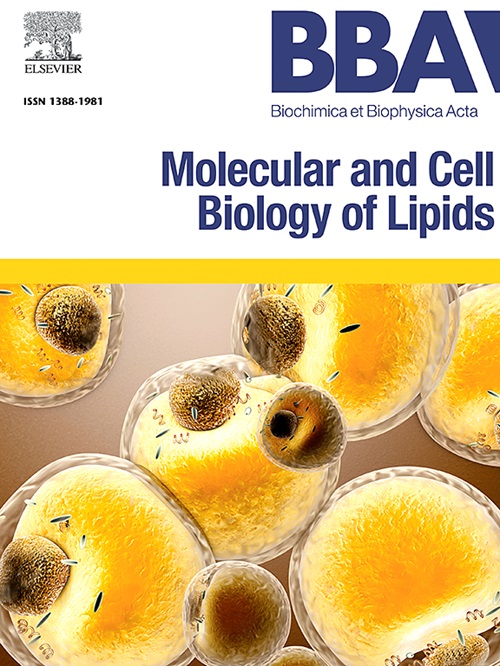OTUD7B controls oxLDL uptake by stabilizing Lox-1 in THP-1 and U937 cells
IF 3.3
2区 生物学
Q2 BIOCHEMISTRY & MOLECULAR BIOLOGY
Biochimica et biophysica acta. Molecular and cell biology of lipids
Pub Date : 2025-04-26
DOI:10.1016/j.bbalip.2025.159618
引用次数: 0
Abstract
Background
The scavenger receptor Lox-1 plays a crucial role in mediating the uptake of oxidized low-density lipoprotein (oxLDL) by macrophages, thereby promoting foam cell formation and the development of atherosclerosis. Recent studies have suggested that ubiquitination plays a role in accelerating the degradation of Lox-1. However, the specific mechanisms underlying how the ubiquitin-proteasome system regulates the stability and function of Lox-1 remain poorly understood.
Results
In our study, we identified OTUD7B, a deubiquitinase, as a potent stabilizer of Lox-1 in THP-1 and U937 cells. Knockdown of OTUD7B significantly reduced the level of Lox-1 and impaired the uptake of oxLDL by these cells. Furthermore, we found that OTUD7B interacts with Lox-1 and deubiquitinates it, thereby promoting its degradation. Importantly, overexpression of Lox-1 effectively rescued oxLDL uptake by OTUD7B-deficient THP-1 and U937 cells.
Conclusions
Our findings indicate that OTUD7B plays a crucial role in controlling oxLDL uptake by enhancing the stability of Lox-1. This highlights the potential significance of targeting the OTUD7B-Lox-1 axis as a therapeutic strategy for atherosclerosis.
OTUD7B通过稳定THP-1和U937细胞中的Lox-1来控制oxLDL摄取
背景清除受体Lox-1在巨噬细胞对氧化低密度脂蛋白(oxLDL)的摄取中起着至关重要的作用,从而促进泡沫细胞的形成和动脉粥样硬化的发展。最近的研究表明,泛素化在加速Lox-1的降解中起作用。然而,泛素-蛋白酶体系统如何调节Lox-1的稳定性和功能的具体机制仍然知之甚少。结果在我们的研究中,我们发现OTUD7B,一种去泛素酶,是THP-1和U937细胞中Lox-1的有效稳定剂。敲低OTUD7B显著降低了Lox-1的水平,并损害了这些细胞对oxLDL的摄取。此外,我们发现OTUD7B与Lox-1相互作用并使其去泛素化,从而促进其降解。重要的是,Lox-1的过表达有效地挽救了otud7b缺陷THP-1和U937细胞对oxLDL的摄取。结论OTUD7B通过增强Lox-1的稳定性,在控制oxLDL摄取中起重要作用。这突出了靶向OTUD7B-Lox-1轴作为动脉粥样硬化治疗策略的潜在意义。
本文章由计算机程序翻译,如有差异,请以英文原文为准。
求助全文
约1分钟内获得全文
求助全文
来源期刊
CiteScore
11.00
自引率
2.10%
发文量
109
审稿时长
53 days
期刊介绍:
BBA Molecular and Cell Biology of Lipids publishes papers on original research dealing with novel aspects of molecular genetics related to the lipidome, the biosynthesis of lipids, the role of lipids in cells and whole organisms, the regulation of lipid metabolism and function, and lipidomics in all organisms. Manuscripts should significantly advance the understanding of the molecular mechanisms underlying biological processes in which lipids are involved. Papers detailing novel methodology must report significant biochemical, molecular, or functional insight in the area of lipids.

 求助内容:
求助内容: 应助结果提醒方式:
应助结果提醒方式:


